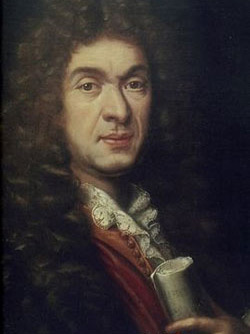Jean-Baptiste Lully
The Baroque Period
Public domain, via Wikimedia Commons
Although Jean-Baptiste Lully was originally from Italy, from 1661 until 1687 he dominated the French musical scene due to his appointment as Superintendent of the King's Chamber Music under Louis XIV.
He was born Giovanni Batista Lulli in Florence, Tuscany in 1632, where he took music lessons from a Franciscan friar and learned to play the guitar. He moved to France at the age of fourteen to join the court of Charles de Lorraine, Duke of Guise.
He soon began working for the duke's niece, Mademoiselle de Montpensier, but she became involved in a scandalous relationship and later an actual rebellion against King Louis known as "La Fronde," and was exiled from the court.
Lully entered the service of King Louis XIV and became well known for his operas and ballets, a type of instrumental opera where the story is told through dance rather than song. He directed "Les Vingt-Quatre Violons du Roi," King Louis' very large (for the baroque period) royal orchestra. Lully's operas combined the baroque homophonic musical style with ballet to great success. He often partnered with the famous French playwright Molière for the libretti of his operas. The king himself would often perform in Lully's ballets.
Louis XIV deliberately used music and dance as a way of socially controlling the French nobility. Attendance at court balls was mandatory, and nobles were expected to instantly recognize and properly execute the various styles of music in each dance suite. The stakes were high; a missed beat could cause a loss of favor with the king.
The movements of a baroque dance suite were distinguished by their tempo, meter, and ornamental style. The four most common dances included:
- Allemande (stately 4/4)
- Courante (moderate 3/2, 3/4, or 6/4)
- Sarabande (slow 3/4)
- Gigue (fast 6/8)
Additional movements were often added and could include:
- Minuet (stately 3/4)
- Bourrée (fast 4/4)
- Gavotte (moderate 4/4 with two quarter note anacruces)
- Chaconne (slow 3/4)
- Sicilienne (slow 6/8, minor key)
- Polonaise (moderate 3/4, two-bar phrases)
During a rehearsal in 1687, Lully became unsatisfied with the orchestra's tempo and began to pound out the beat with his cane. While doing this, he accidentally stabbed himself in the foot, developed gangrene, and died.
